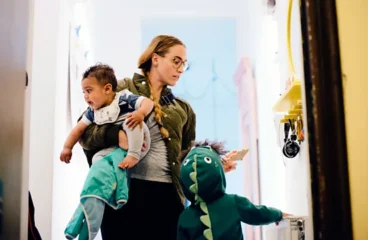Originally published on BBC.com, written by Melissa Hogenboom. When it comes to household responsibilities, women perform far more cognitive and...
Read MoreShared Responsibility & Mental Overload
Why It Matters:
Women carry the bulk of invisible labor in the home and the workplace—scheduling, remembering, anticipating, and managing everyone else’s needs. This mental overload often goes unnoticed but has real consequences, eroding well-being, increasing stress, and contributing to burnout. Over time, the weight of these responsibilities can limit women’s capacity for personal growth, professional advancement, and even self-care.
This imbalance is compounded by societal expectations that position women as primary caregivers and organizers, while undervaluing the emotional and cognitive labor they provide. The constant juggling of work, family, and community obligations leaves little room for rest, reflection, or pursuing individual goals.
Addressing mental overload and shared responsibilities is critical—not only for women’s health and resilience, but also for creating more equitable households, workplaces, and communities. Supporting women in distributing responsibilities and finding sustainable ways to manage their mental load empowers them to thrive, lead, and fully participate in all areas of life.
Overload
/ˈoʊvərˌloʊd/
NOUN
A state or situation where a system, person, or object is burdened beyond its capacity, causing stress, strain, or reduced effectiveness.
The Digital Weight of Comparison
Social media has become another layer of invisible labor for women—managing family group chats, remembering birthdays, curating “perfect” moments, and keeping up appearances online. Behind every post is often an expectation to do more, be more, and look effortless while doing it all. This constant comparison—between friends, colleagues, and strangers—amplifies the pressure women already carry, feeding stress and diminishing self-compassion.
By recognizing how digital culture contributes to mental overload, women can begin to set boundaries that protect their well-being. Choosing authenticity over appearance and connection over comparison helps reclaim time, energy, and peace of mind. When women model digital balance, they lead the way in reshaping social expectations—showing that worth isn’t measured by productivity, perfection, or online validation, but by presence, purpose, and genuine connection.
Start the Truthful Conversation
Your story matters—and it has the power to change how women see themselves and each other. Share your caregiving journey, your challenges, and your wins online, and tag @EveryWomanAllThings to help shift the conversation from comparison to connection. When we tell the truth about care, we make space for every woman to feel seen, valued, and supported.
The Power of Volunteering
Women often carry the weight of mental load—juggling household tasks, caregiving duties, work responsibilities, and the invisible planning that keeps families and communities running. This constant pressure can lead to stress, burnout, and a sense of isolation.
Volunteering provides a space to step outside the daily demands while still channeling the drive to contribute and lead. By joining an organization like The Junior League, women share responsibilities with others who understand the challenges of balancing multiple roles. Collaborative service allows women to lift one another up, exchange support, and experience the power of collective impact.
Through volunteering, women not only give to their communities—they also reclaim time, space, and mental clarity for themselves. Jump in and join. Volunteering isn’t just about serving others—it’s about finding balance, connection, and renewed energy through shared purpose.
Center for Women's Wellbeing Shared Responsibility & Mental Overload
Managing Mental Overload with Every Woman. All Things.
Originally published in AJLI’s The League Life, written by Jacquelyn Bauman & Ashley Bowles. I need to go to the...
Read MoreMental Load: What it is and How to Manage it
Originally published January 8, 2024 on UCLA Health. Have you ever felt drained — even if you haven’t exerted yourself...
Read MoreHow The Junior League Is Taking Action
Junior League Members live the realities of women’s well-being every day—balancing careers, caregiving, and community. Because they understand these challenges firsthand, they’re uniquely equipped to lead change.
Through training, advocacy, and community partnerships, The Junior League is addressing issues like caregiving inequities, financial insecurity, and the invisible mental load women carry. With national reach and local impact, Leagues are piloting real solutions and influencing systems that better support women’s well-being.
The Junior League turns lived experience into leadership—and compassion into action.




